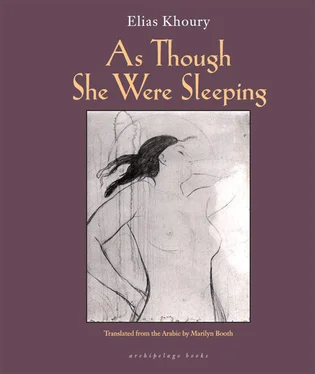Where? I asked. In the garbage. Why? Because, it’s haraam . False teeth mustn’t be buried with the dead. A dead person has to return to her Lord exactly as He created her.
In the garbage! I cried. And I went right to the garbage can and began to search. I didn’t find them, no. Not then. But yesterday, when I was drowning. . no, maybe this is another dream, Lord how I’ve come to confuse things! It has gotten so I don’t know the whys and whens and hows anymore. The important thing is that I took the set of dentures and went to my grandmama but she had vanished. I didn’t know where she went. I didn’t know what I would do with her teeth. Women were sitting all around me, crying and crying some more. And then I fell. I don’t know how. I was hanging on to the akadoniya tree with my feet braced against some heavy branches, and I was eating a hard green fruit I had picked from it, and I was aware of myself only when I began to fall. When I hit the ground I broke my teeth. I put my hand up to my mouth and it’s as if they were my grandmama’s teeth. I don’t know. There was a lot of water, there were eyes and tears. The women’s tears were pouring onto the ground and I saw my grandmama drowning and I started crying. I put my hands out to grab my grandmama’s hand but I couldn’t reach her. I felt like I was drowning too. And then I don’t know, everything was blue and I was asleep in bed, and the mattress was like a lake and Sitti sat next to me. She put her hand on my belly and gave me the icon. And I saw the blue woman: it was as though she had risen right out of the icon. I said, Grandmama, this is the woman, it’s her, the one who put her hand on my tummy and it started growing. A sabiyy , she said. And she told me we must name this boy Mikhail after Sister Milana’s convent, since the nun safeguards me, too, with her prayers. But I said to her, no, I’m going to name him Issa. His name is Issa, I’m naming him after the Messiah. Because that’s what the blue woman wants. I opened my eyes and got up and went into the bathroom. I washed my face, heated some water, and bathed. You were snoring away. Yesterday I tried to turn you over because the sound of it was so loud. But you were all curled up around yourself, like at the Hotel Massabki. God knows I was afraid for you there. No, not when you were in the bathroom and you weren’t answering me. That was easy enough to understand. At the time I felt. . no, not right then, but later, seeing you asleep in bed, curled up as if you were a little baby boy in his mama’s belly, I felt what you wanted was a mother. Now don’t misunderstand me, and please, don’t interrupt me. I don’t like hearing this kind of talk. No, I don’t know what all you do and I don’t want to know. Did I ever ask you, even once? If I didn’t ask you, then why answer me? No, I don’t want to understand, these are matters only for you. You told me you don’t want to go to Jaffa, and anyhow I don’t like it there. What was I saying? Oh yes, I could feel my belly getting big and round, all of me becoming round, and I understood then what the woman had been saying to me, that woman who draped her hair in a blue shawl. I understood that I was pregnant. Me, Mr. Mansour — pregnant since last night. That’s what I wanted to tell you. That’s all.
Mansour was utterly bewildered, his tongue tied. He tried to puzzle out the way she had of conveying things; to even understand what she had said. He sipped his Turkish coffee slowly, his head bent. But he was exasperated, too. Why didn’t she say things in a straightforward manner? Why did the woman wander among words, meandering amidst them as though she were speaking in a dream and not in wide-awake reality? He wanted to wake her up from this ongoing somnolence of hers, and from her insistent refusal to let him express his love. When she said she was pregnant, he tried to interrupt her, to say he had slept with her the night before and that it had been the most beautiful lovemaking ever, the very best they’d had. He said he had seen how it exalts a female when she receives her male and takes him into her. This is the kind of love that makes a woman pregnant, he said, a smile of triumph on his lips.
You don’t have anything to do with it, she said.
What do you mean by that?
Yaani . . well, maybe. How do I know. I don’t remember.
You don’t remember?
How should I remember, I was asleep and dreaming. The dream I just told you.
You remember the dreams but you forget what was actually happening?
What — what happened?
God give me patience! All right, nothing happened! he said, seething with anger. He must start waking her up at night when he slept with her, he thought. He would wake her up and he would order her to remember everything. He would end this foolish performance that had begun on their very first night in the hotel. True, he had collapsed in the bathroom, but who wouldn’t have? What man would have been capable of withstanding the icy cold whistling along Dahr el-Baydar? Mansour alone withstood it. He fought back. He could not bear the idea of returning to Beirut in defeat. He would have been forced to stay in the Shahin family home while waiting to go to Nazareth.
Salim, the eldest brother, did not attend the wedding. When Mansour asked about him, the only answer he got was a cryptic sentence from Musa. Mansour was the only one among the extended family who did not know the story of Salim. From Musa he heard half the story, but still he did not understand why the rupture had happened. Musa told him that Salim had wanted to become a Catholic and enter the Jesuit order. He studied law at their university but then he went a little crazy. Salim had entered the university thanks to a reference letter from Father Eugene, who ran the Sunday school in a cellar vault attached to the Jesuit Fathers’ monastery in the quarter. It was not a real school. “Frère” Eugene lured in poor boys by handing out candy. He made them watch religious films and forced them to attend Latin mass. Salim was bewitched by the cinema. He took his brothers along to watch a film about the passion of the Messiah. He was astonished to see them all drop off to sleep. Instead of becoming absorbed in how light became images, instead of letting those images dazzle them, the boys fell asleep. Musa shrieked in fright when he saw the enormous shapes occupying the whole of the huge white screen. Only Milia was an enthusiast when it came to the cinema, but Brother Eugene told Salim that Sunday school was only for boys and Milia could not come in.
I’ll go back with you, spoke up Musa. I’m afraid of films and I’m going back with you. But Milia ordered him to go in with everyone else and she returned alone to the house.
Musa said that in Salim, Frère Eugene found a true iwazza . Mansour did not understand the expression, but he made as though he did. He always felt disgusted with himself when Milia stared at him, irritated, every time he asked her the meaning of a Beiruti expression that he didn’t understand.
It’s as though you don’t know Arabic, she said.
So he began acting as though he understood everything. When Milia came to live in Nazareth, rather than adopting her husband’s dialect and pronunciation — that of the town in which she now lived — she went on speaking in her own Beiruti way, words full and heavy with the flesh of the tongue. Beirut folks worked their lips and their tongues to weight down their words, and the syllables glided downward. Only Milia sang out her letters. She preserved the thickness of her local dialect but instead of pronouncing the sounds from her cheeks and tongue she launched them from her lips so that her words floated out soft and light, as rich and full as they were.
You don’t speak like Beirut folk do, he told her.
Читать дальше












